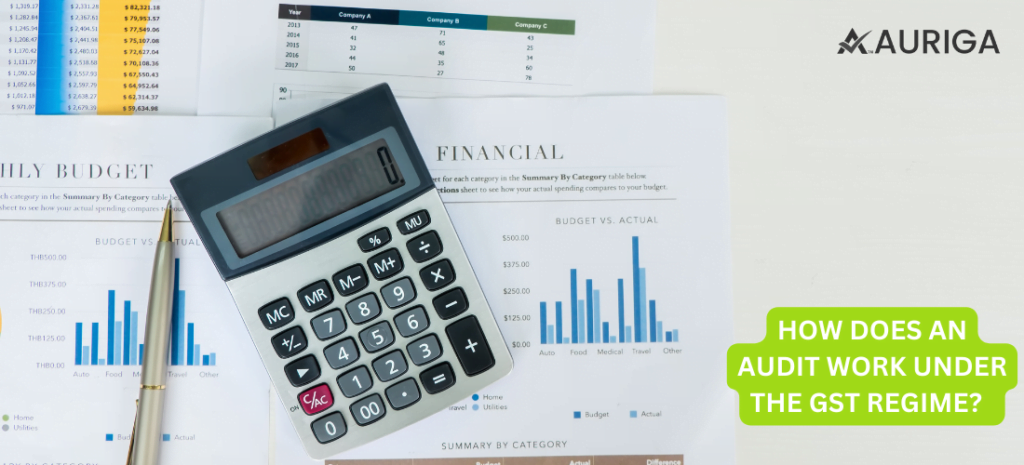HOW DOES AN AUDIT WORK UNDER THE GST REGIME?
Introduction
Toggle
HOW DOES AN AUDIT WORK UNDER THE GST REGIME?
INTRODUCTION
An audit under the GST regime is an examination of the records and other documents maintained by a GST registered person. The purpose of the audit is to verify the correctness of the turnover declared, taxes paid, refund claimed, and input tax credit availed. The audit also assesses the compliance of the taxpayer with the provisions of the GST Act.
Types of audits under GST
There are two types of audits under GST:
- Departmental audit: This is conducted by the GST authorities.
- Taxpayer-initiated audit: This is conducted by the taxpayer themselves.
Departmental audit
The GST authorities may conduct a departmental audit of any GST registered person. The audit may be conducted at the taxpayer’s premises or at the GST office. The auditor will examine the taxpayer’s records and other documents, and may also interview the taxpayer and their employees.
The taxpayer will be given a notice of the audit at least 15 days before the commencement of the audit. The audit must be completed within 3 months from the date of commencement of the audit. The GST authorities may extend the audit period
ADVANTAGES
Enhanced Compliance: GST audits help enhance compliance among taxpayers. It ensures that businesses are correctly calculating and reporting their GST liabilities, reducing the likelihood of tax evasion.
Increased Revenue: By detecting non-compliance and tax evasion, GST audits contribute to increased revenue collection for the government. This additional revenue can be used for various public welfare initiatives.
Uniform Tax System: GST has brought about a uniform tax system across India, replacing a complex web of state and central taxes. This simplification can make auditing and compliance easier.
Transparency: GST audits promote transparency in financial transactions, as businesses are required to maintain proper records and submit detailed returns.
Standardization: GST has standardized tax rates and procedures, reducing the scope for disputes and making it easier for auditors to verify transactions.
Reduction in Tax Cascading: GST has eliminated the cascading effect of taxes, where taxes were levied on top of taxes. This simplifies the audit process by reducing complexities in tax calculations.
DISADVANTAGES
Complexity: The GST law is complex, with multiple tax rates, various compliance requirements, and frequent changes in rules. This complexity can make audit work challenging and prone to errors.
IT Infrastructure: The success of GST largely depends on robust IT infrastructure. Technical glitches and system issues can hamper audit work and compliance.
Increased Compliance Burden: GST audits have increased the compliance burden on businesses. They need to maintain extensive records, file multiple returns, and adhere to various regulations, which can be time-consuming and resource-intensive.
Increased Costs: Complying with GST, including audit work, can lead to increased costs for businesses. Hiring professionals and investing in technology for compliance can be expensive.
Audit Scrutiny: GST audits can subject businesses to close scrutiny by tax authorities, potentially leading to disputes and litigation.
Transition Challenges: The transition from the previous tax regime to GST posed challenges for many businesses. Auditors may encounter discrepancies and complexities during this transition period.
Penalties and Fines: Non-compliance with GST regulations can result in significant penalties and fines. This adds financial risk for businesses and increases the stakes for accurate audit work.
CONCLUSION
Audit under GST is an important tool for ensuring compliance with the GST Act. It can also help to detect and prevent fraud and evasion. However, it is important to note that audit can be time-consuming and expensive, and it can be disruptive to the business
HOW AURIGA ACCOUNTING HELP YOU
GST Audit Software: Auriga Accounting can develop or customize GST audit software that automates various audit processes. This software can help auditors efficiently analyze GST returns, invoices, and financial data to identify discrepancies or potential non-compliance issues.
Data Analytics: Auriga Accounting can create data analytics tools that assist auditors in analyzing large volumes of transaction data. These tools can help identify patterns, anomalies, and potential red flags, making the audit process more effective.
Compliance Monitoring: Auriga Accounting can be designed to monitor compliance in real-time. Auditors can set up alerts and notifications to flag unusual or suspicious transactions for further investigation.
Document Management: Effective document management is essential for GST audit work. Auriga Accounting can develop document management systems that enable easy storage, retrieval, and sharing of relevant documents and records.
Integration with GSTN: Auriga Accounting can integrate audit software with the Goods and Services Tax Network (GSTN) for seamless access to taxpayer data, which can expedite the audit process and reduce manual data entry.
Risk Assessment: Auriga Accounting can help auditors assess the risk associated with different taxpayers or industries. This can aid in prioritizing audits and allocating resources effectively.
Audit Trails: Creating digital audit trails ensures transparency and accountability in the audit process. Auriga Accounting can develop systems that track all audit-related activities and changes made during the audit.
Reporting and Dashboards: Auriga Accounting can provide auditors with real-time insights into audit progress, findings, and compliance levels. This enhances decision-making during the audit.
Training and Support: Auriga Accounting can provide training and support services to auditors and tax professionals on how to use and leverage technology tools effectively for GST audit work.
Security Measures: Ensuring the security of sensitive taxpayer data is paramount. Auriga Accounting can implement robust cybersecurity measures to protect audit-related data from unauthorized access or breaches.



